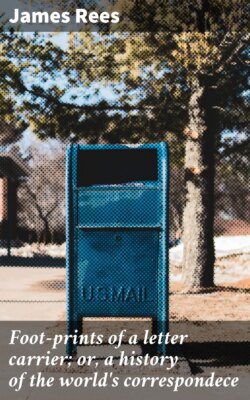Читать книгу Foot-prints of a letter carrier; or, a history of the world's correspondece - James Rees - Страница 18
На сайте Литреса книга снята с продажи.
THE CONFUSION OF TONGUES—THE CONFOUNDING OF LANGUAGES.
ОглавлениеTable of Contents
One of the most remarkable passages in Holy Writ is that which speaks of the confounding of language. “And the Lord said, Behold, the people is one, and they have all one language. Let us go down, and there confound their language, that they may not understand one another’s speech. So the Lord scattered them abroad from thence upon the face of the earth, and they left off to build the city.”
The name of it was called “Babel” (confusion), from the Hebrew. The consequence of this eternal fiat, which went forth like a flash of lightning, was, that the people became as strangers to each other, and spoke a language wild and chaotic. Gesticulation took the place of words; and hence their punishment for daring to contest power with their Creator.
The building of the Tower of Babel was an act of Nimrod’s, who “esteemed it a piece of cowardice to submit to God;” and he urged the people on to build this tower, saying, He would be revenged on God if he should ever have a mind to drown the world again; for that he would build it so high the waters could not reach it. The place wherein they built the tower is now called Babylon. From this date may be ascribed the history of languages. It is supposed, however, that Noah and other pious persons, chiefly the descendants of Shem in the line of Eber, not being concerned in this project, retained the original language. Now, if this was, as it is highly probable, the Hebrew, we may conclude it was thus called from Eber, to whose descendants it was peculiar; and perhaps this is the most satisfactory reason that can be assigned why Abraham is called the Hebrew and his posterity Hebrews.
It was not, however, the mere confusion of tongues which rendered the people incapable of conversing one with another, but it was the extraordinary miracle connected with it of the mind’s confusion. Incapable, therefore, of bringing their original language back to its former use, they invented new languages, new phrases; and thus in time every great nation had its own language. The dividing of languages was therefore the dividing of nations. The precise number of original languages then heard for the first time cannot be determined. The Hebrew, Greek, Latin, Teutonic, Sclavonian, Tartarian, and Chinese languages are considered to be original: the rest are only dialects from them.
History is silent on the early data of the building of the Tower of Babel; nor is one of its builders’ names mentioned, except the somewhat obscure intimation respecting Nimrod.13
Babylon subsequently became the head-quarters of idolatry, and the type of the “mystical Babylon,” the mother of harlots and abominations of the earth.
The glory of Babylon departed. Its walls of sixty miles in circumference, eighty-seven feet thick and three hundred and fifty feet high, built of brick and containing twenty-five gates of solid brass and two hundred and fifty towers, are now the wonder of men who gaze upon the debris of “splendor in ruins.”
The ruins of “Birs Nimrod,” on an elevated mount, are supposed to be the Tower of Babel of the sacred Scriptures, and the temple of Belus, so minutely described by Herodotus. The base of this tower measures two thousand and eighty-two feet in circumference. Babylon was in its glory in the time of Nebuchadnezzar. It was besieged and taken by Cyrus B.C. 538, and afterwards by Alexander the Great.
